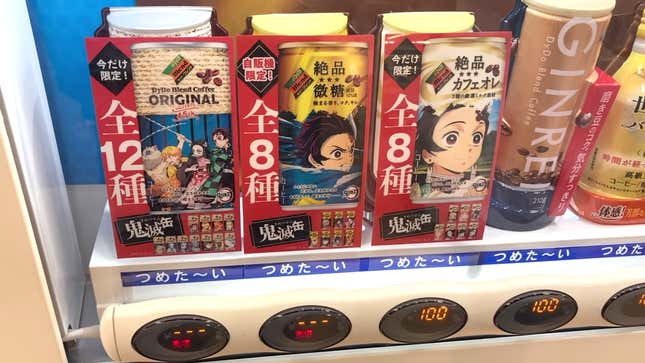
Japan is famous for its canned coffee. But with consumption on the slide, canned coffee makers needed to wake up sales. They found it: Anime.
As Mainichi News reports, Osaka’s DyDo Drinco launched its Demon Slayer: Kimetsu no Yaiba line of “collab-cans” in October 2020. Featuring 28 different designs, some “Kimetsu-can” as they’re called were only sold in vending machines, with fans trying to collect the full set. The result was a smash hit, selling 100 million cans.
According to DyDo, more women and younger customers bought the anime-branded drink. It also became Twitter and YouTube fodder.
“I somehow wanted to bring excitement back to canned coffee, our category of products that has struggled the most,” said DyDo president Tomiya Takamatsu, who added, “To be honest, it was a hit beyond our expectations. It was a shock; a very happy one.” The Demon Slayer canned coffee, however, ended production earlier this spring.
DyDo isn’t alone. Asahi Soft Drinks previously sold Wonda branded canned coffee with Lupin III and Attack on Titan designs, while Coca-Cola Japan’s Georgia canned coffee was covered in Gundam.
Canned coffee has been facing increased competition in Japan over the past decade or so. Convenience stores now sell inexpensive coffee that ground from beans, while Starbucks has become a Japanese institution and domestic coffee chains continue to cater to customers. After launching 7-Eleven launched its own in-store Seven Cafe in 2013, it has now sold over 3.9 billion cups of coffee. At convenience stores, it’s possible to get a cup of coffee for 100 yen (92 cents).
Another problem for the canned coffee market has been that cigarette vending machines now require an age-verified Taspo (short for “tobacco passport) card, which might mean fewer blue-collar and white-collar workers are making the one-two-punch purchase of cigarettes and canned coffee at vending machines. Instead, they’re venturing into convenience stores where they have more caffeinated options. Taspo, which launched in 2008, makes smokers apply for the card, which for many might be more of a pain than simply going to a Family Mart, Lawson, or wherever. This has impacted canned coffee.
“When people were prevented from buying cigarettes from vending machines without a Taspo card, cigarette vending machines disappeared all at once from the streets. Before then, there were many locations where DyDo beverage vending machines and tobacco machines stood side by side, and many people had bought their coffee and cigarettes at the machines,” explained Takamatsu.
“We would like to thoroughly investigate how many customers are still buying our products and why even after the campaign is over,” he added, “and plan our next campaign.”